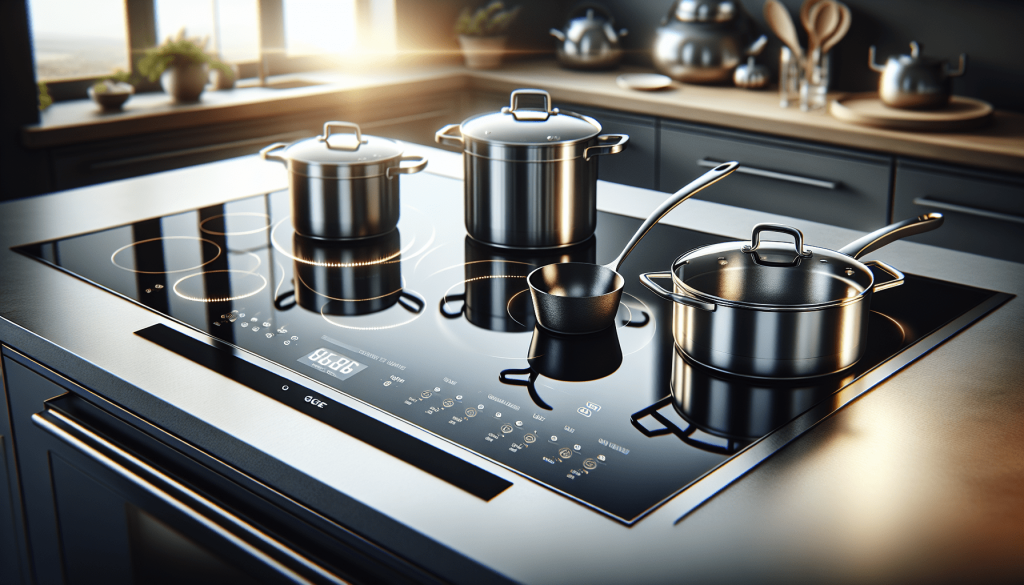If you’re the proud owner of a glass top stove, you know just how sleek and stylish they can make your kitchen look. But finding the right cookware to use with these delicate surfaces can be a bit of a challenge. That’s where we come in. In this article, we’ll explore the world of cookware specifically designed for glass top stoves, helping you find the perfect pots and pans to ensure optimal performance and longevity for your stove. From non-stick coatings to heat distribution, we’ll cover all the essential features to consider so that you can cook confidently and enjoy that perfect sizzle every time. Let’s dive in and discover the best cookware for glass top stoves!

Material
Stainless Steel
Stainless steel cookware is a popular choice for glass top stoves due to its durability, heat resistance, and sleek appearance. It is a non-reactive material, meaning it won’t interact with acidic or alkaline foods, ensuring that the taste of your meals remains unaffected. Stainless steel is also known for its excellent heat distribution, ensuring even cooking throughout your dishes. With proper care, stainless steel cookware can last for years, making it a worthy investment for your glass top stove.
Aluminum
Aluminum cookware is another great option for glass top stoves. It is lightweight and efficient in conducting heat, which results in fast and even cooking. However, it is important to choose aluminum cookware with a flat and smooth bottom to avoid any potential scratches on your glass top stove. Additionally, many aluminum cookware sets feature a non-stick coating, making it easier to cook with minimal oil or butter.
Copper
Copper cookware is beloved by professional chefs for its exceptional heat conductivity and precise temperature control. It heats up quickly and evenly, allowing for more precise cooking results. However, it is crucial to ensure that copper cookware has a stainless steel or ceramic coating on the cooking surface to prevent any potential reactions with acidic foods. Copper cookware requires regular maintenance and polishing to keep its lustrous appearance, but it can be a stunning addition to your kitchen and glass top stove.
Cast Iron
Cast iron cookware is renowned for its durability and ability to retain heat. It may take longer to heat up compared to other materials, but once it reaches the desired temperature, it maintains a steady heat level. This is ideal for glass top stoves as it helps to prevent hot spots and ensures even cooking. However, it is essential to ensure that your cast iron cookware has a smooth and flat bottom to avoid scratching your glass top stove. Regular seasoning and proper care are necessary to maintain the longevity and non-stick properties of cast iron cookware.
Flat Bottom
Importance of a flat bottom
When using a glass top stove, it is crucial to have cookware with a flat bottom. The flat surface ensures maximum contact with the glass, facilitating efficient heat transfer and even cooking. Uneven or warped bottoms can cause hot spots on the stove’s surface, leading to unevenly cooked food or even damage to your glass top stove. Investing in cookware with a flat bottom is essential for achieving optimum cooking results and maintaining the lifespan of your glass top stove.
Compatible cookware
Look for cookware that explicitly states its compatibility with glass top stoves. Manufacturers often indicate whether their products are suitable for glass top stoves to help consumers make informed decisions. Cookware with a flat and smooth bottom is the best option to minimize the risk of scratching the surface of your glass top stove. Additionally, consider cookware with a heavy-bottomed design, as it helps distribute heat evenly and prevents hot spots.
Non-Scratch
Importance of non-scratch cookware
Glass top stoves are prone to scratches, which can dull the appearance of your appliance and impact its functionality. Non-scratch cookware is crucial to protect the fragile surface of your glass top stove and ensure its longevity. By using non-scratch cookware, you can confidently cook and move pots and pans on your glass top stove without worrying about damaging it. Investing in non-scratch cookware is a wise decision to avoid costly repairs or replacements in the future.
Materials to look for
Opt for cookware with gentle and non-abrasive materials to minimize the risk of scratches on your glass top stove. Stainless steel with a polished finish, enamel-coated cast iron, and ceramic cookware are excellent options for non-scratch cooking. These materials provide a smooth surface that glides easily on the glass top stove, reducing the chances of accidental scratches. Additionally, ensure that the cookware has a flat and smooth bottom to avoid any potential scratching.
Heat Distribution
Importance of even heat distribution
Even heat distribution is critical for achieving consistent cooking results and preventing hot spots. It ensures that food is cooked uniformly, eliminating the risk of undercooked or overcooked areas in your dishes. For glass top stoves, even heat distribution is particularly important as the heat source is directly beneath the cookware. Uneven heat distribution can lead to uneven cooking and may result in burnt or undercooked food. Choosing cookware with excellent heat distribution is key to mastering your glass top stove cooking.
Materials that provide even heat distribution
Stainless steel, aluminum, and copper are materials known for their exceptional heat conductivity and even heat distribution. Stainless steel is particularly renowned for its ability to distribute heat evenly across the cooking surface. Aluminum and copper also excel in conducting heat promptly and evenly, allowing for precise temperature control. These materials ensure that your food is cooked uniformly, eliminating any concerns about inconsistent cooking results with your glass top stove.
Weight
Importance of weight
The weight of your cookware plays a crucial role in both cooking efficiency and safety. Heavy cookware tends to provide more stability on glass top stoves, reducing the risk of accidental tipping and spills. Additionally, heavyweight cookware often comes with superior heat retention properties, ensuring consistent cooking temperatures. However, it is important to consider your personal preferences and physical abilities when choosing cookware weight as some individuals may find heavy cookware challenging to handle.
Lightweight cookware options
If you prefer lightweight cookware for easier handling, there are various options available that are suitable for glass top stoves. Aluminum cookware is renowned for its lightweight nature, making it effortless to maneuver around your glass top stove. Additionally, stainless steel cookware often features a lightweight design without compromising on durability and heat conduction. Consider cookware sets labeled as lightweight or designed specifically for ease of use to find the perfect balance between weight and functionality.
Size and Capacity
Suitable sizes for glass top stoves
When selecting cookware for your glass top stove, it is essential to consider the size of the burners. Oversized cookware can extend beyond the heating elements, resulting in inefficient heating and potential safety hazards. It is recommended to choose cookware that matches the size of your burners or is slightly smaller to ensure that the entire surface area makes contact with the heat source. This will facilitate even cooking and prevent uneven heat distribution.
Optimal capacity for glass top stoves
While it is essential to consider the dimensions of your glass top stove, it is equally important to determine the optimal capacity of cookware for your cooking needs. Choosing cookware with an appropriate capacity ensures that you can cook the desired quantity of food without overcrowding the cooking surface. Overfilled cookware can impede proper heat circulation and affect cooking outcomes. Consider your typical cooking requirements and select cookware with a capacity that meets your needs while accommodating the size of your glass top stove.
Handles
Heat-resistant handles
When cooking on a glass top stove, it is vital to have heat-resistant handles on your cookware. Heat-resistant handles prevent burns and ensure a comfortable cooking experience. Look for cookware with handles made of materials such as silicone, stainless steel, or phenolic resin, as these materials have excellent heat resistance properties. Having heat-resistant handles allows you to confidently move and handle cookware without the use of pot holders or oven mitts, enhancing convenience and safety.
Easy-grip handles
In addition to being heat-resistant, easy-grip handles are beneficial for maneuvering cookware effortlessly on your glass top stove. Look for handles that are ergonomically designed and offer a comfortable grip. Handles with non-slip surfaces or contoured shapes are particularly helpful in providing a secure grasp, reducing the risk of accidental slips or spills. Easy-grip handles make it more convenient to lift, stir, and pour from your cookware, ensuring a hassle-free cooking experience.
Lids
Importance of well-fitted lids
Using well-fitted lids when cooking on your glass top stove has multiple benefits. Firstly, lids help to trap heat and moisture inside the cookware, leading to faster cooking times and more energy-efficient cooking. Secondly, well-fitted lids prevent splatters and spills, keeping your glass top stove clean and in pristine condition. Additionally, lids help to retain the flavors and nutrients of your food, resulting in more delicious and nutritious meals.
Heat-resistant lids
When choosing cookware for your glass top stove, prioritize lids that are heat-resistant. Heat-resistant lids are designed to withstand high temperatures without warping or cracking. This ensures that your lids maintain their functionality and durability over time. Look for lids made from materials such as tempered glass or stainless steel, as they are known for their excellent heat resistance properties. Heat-resistant lids not only enhance safety but also contribute to efficient and effective cooking.
Induction Compatibility
Cookware suitable for induction cooktops
If you have an induction glass top stove, it is crucial to choose cookware that is compatible with induction cooktops. Induction cooking relies on electromagnetic fields to heat the cookware directly, requiring specific materials for successful use. Cookware suitable for induction cooktops typically features a magnetic base or is made from magnetic materials such as stainless steel or cast iron. By choosing induction-ready cookware, you can fully utilize the advanced capabilities of your induction glass top stove.
Features to look for in induction-ready cookware
When selecting induction-ready cookware for your glass top stove, look for features that enhance its performance. Opt for cookware with a flat and smooth bottom to ensure maximum contact with the induction cooktop. Additionally, consider cookware with a heavy-bottomed design, as it helps distribute heat evenly and prevents hot spots. Verify that the cookware has the induction symbol or explicitly states its compatibility with induction cooktops. Taking these features into consideration will ensure successful and efficient cooking on your induction glass top stove.
Maintenance
Easy-to-clean cookware
Keeping your cookware clean is essential for maintaining its performance and prolonging its lifespan. Look for cookware that is easy to clean to save time and effort in your kitchen routine. Stainless steel, enamel-coated cast iron, and ceramic cookware are known for their smooth and non-stick surfaces, making them easy to clean with minimal effort. Avoid cookware with intricate designs or hard-to-reach crevices, as they can trap food particles and make cleaning more challenging.
Dishwasher-safe cookware
If you prefer the convenience of using a dishwasher, make sure to choose cookware that is dishwasher-safe. Check the manufacturer’s instructions or product specifications to verify that the cookware can be safely cleaned in a dishwasher. Dishwasher-safe cookware allows for effortless cleanup, saving you valuable time and ensuring that your cookware remains in optimal condition. However, always keep in mind that handwashing certain cookware, such as cast iron or copper, may be required to maintain their specific properties and finishes.
In conclusion, when selecting cookware for your glass top stove, consider factors such as material, flat bottom design, non-scratch properties, heat distribution capabilities, weight, size and capacity, handles, lids, induction compatibility, and maintenance requirements. Stainless steel, aluminum, copper, and cast iron are popular materials used in cookware for glass top stoves, each offering unique advantages and features. By choosing cookware that suits your needs and preferences in these areas, you can enhance your cooking experience, protect your glass top stove, and create delicious meals with ease.
